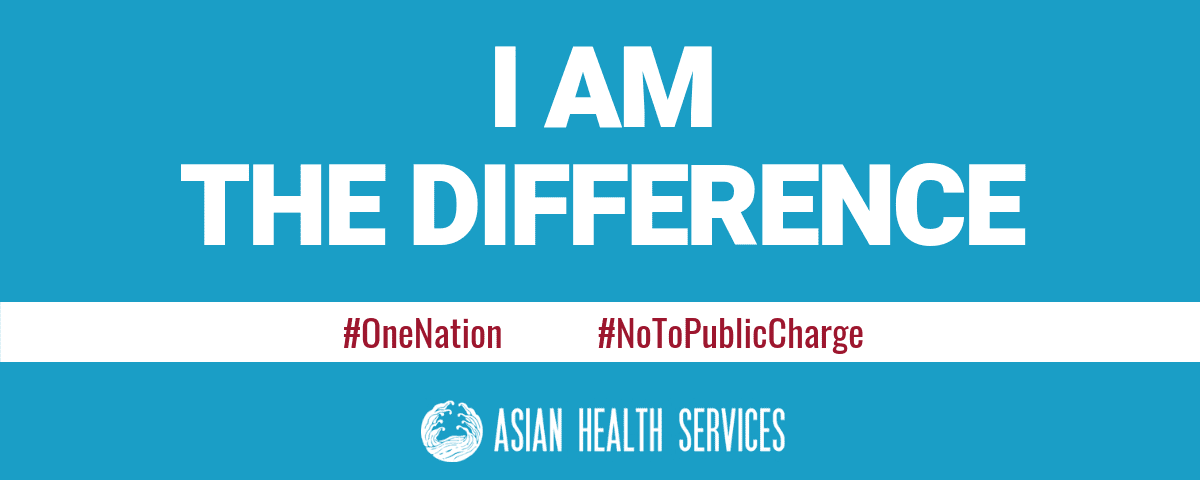
The proposal of a new “public charge” law is scheduled to be published for comments on October 10. If you are worried or confused about the proposed “public charge” law and have questions, we hope the answers below can address your concerns.
1. What are the new proposed programs that will be considered for public charge?
Non-emergency Medicaid (Medi-Cal); Supplemental Nutrition Assistance Program (SNAP) – CalFresh; Medicare Part D Low Income Subsidy (for prescription drugs); Housing assistance, such as public housing or Section 8 housing vouchers and rental assistance. In addition to cash assistance (SSI and TANF) and long-term care that are currently are considered for public charge.
2. When will the new law take effect?
There will be a 60-day comment period that will end on December 9. Afterwards, the comments will be reviewed and the final law will be published with an effective date – likely another 60 days. Therefore, the new law will not take effect until, at the earliest, 120 days after the publication of the draft.
3. Should I get off of Medi-Cal, CalFresh and other public programs now?
No. The law will look at the use of the above public programs after it is enacted. Currently, there is no law change, so there is no advantage in dropping out of these programs until the law is final.
Also, if Medi-Cal or CalFresh that you participate is funded only by the state of California, it may not be considered for public charge. We will update this answer when it changes.
4. I am a lawful permanent resident (LPR) (I have a green card), can I still apply for citizenship after the new public charge law?
Yes. There is no question or consideration for using public programs when applying for citizenship.
5. I am a refugee. Will the new law apply to me?
No. The law about public charge do not apply to someone who came to US as a refugee.
6. Does this draft law impact everyone?
No. If you are a refugee, asylee, survivor of trafficking, domestic violence or other serious crimes, you are not subject to public charge.
7. Is there any chance that I can be deported for using public programs now?
Yes but it is very rare – only if (1) you are using cash assistance or long-term care within first five years after immigration, (2) you or your sponsor were asked to pay for services used and (3) you or your sponsor refused to pay.
8. Is there any chance that I can be deported for using public programs in the future?
There is no change to the deportation standards in the current proposal other than the expansion of programs to include Medicaid, SNAP, Medicare Part D subsidy and Housing Assistance programs in addition to cash assistance and long-term care. However, US Department of Justice may make changes to the deportation standards in the future. We will update this answer when it changes.
9. My lawyer is telling me that I should not participate in any public programs like Medi-Cal or CalFresh. What should I do?
Lawyers are often very cautious, especially in a time of uncertainty. Lawyers may not be familiar with eligibility rules for these programs and may not fully understand public charge issues. The proposed law says that changes will not apply retroactively. Current or past use of assistance programs, before the law is finalized, will not be considered for immigration purposes.
10. I am a lawful permanent resident, do I have to worry about public charge when I’m coming back from traveling outside the US?
As before, LPRs are advised NOT to travel outside of the US for more than 180 days. If you have been outside the US for more than 180 days, you can be treated as a new entrant and may be considered as a public charge after the new law is implemented. As LPRs do now, limit your travel abroad to less than 180 days.
11. Can I sponsor my family members if I use public programs?
Maybe not. The law for sponsorship has not changed. You can still petition to bring your family members to the US. However, if you are using public programs, you may not be able to file an “affidavit of support” to show that you can financially support them. You may have to find someone else to file the affidavit of support.
12. I am undocumented. If I apply for Medicaid, Food Stamps or other programs for my children, can they report me to immigration enforcement?
No. The information you share when you apply for public programs cannot be used for immigration enforcement purposes. The proposed law change does not change this.
If you apply for your child, you will only be required to provide information about your child’s immigration status. If you are undocumented and applying on behalf of a child, you should not provide any information about your own immigration status. You may say, “I am not applying for health insurance (or Food Stamps) for myself.”
13. Is there anything I can do?
Yes! You can add your voices to the hundreds of thousands of people who will oppose this proposed law. Please tell AHS staff you want to write a comment to say NO to this proposal. AHS is also working with hundreds of organizations nationwide to fight this.
